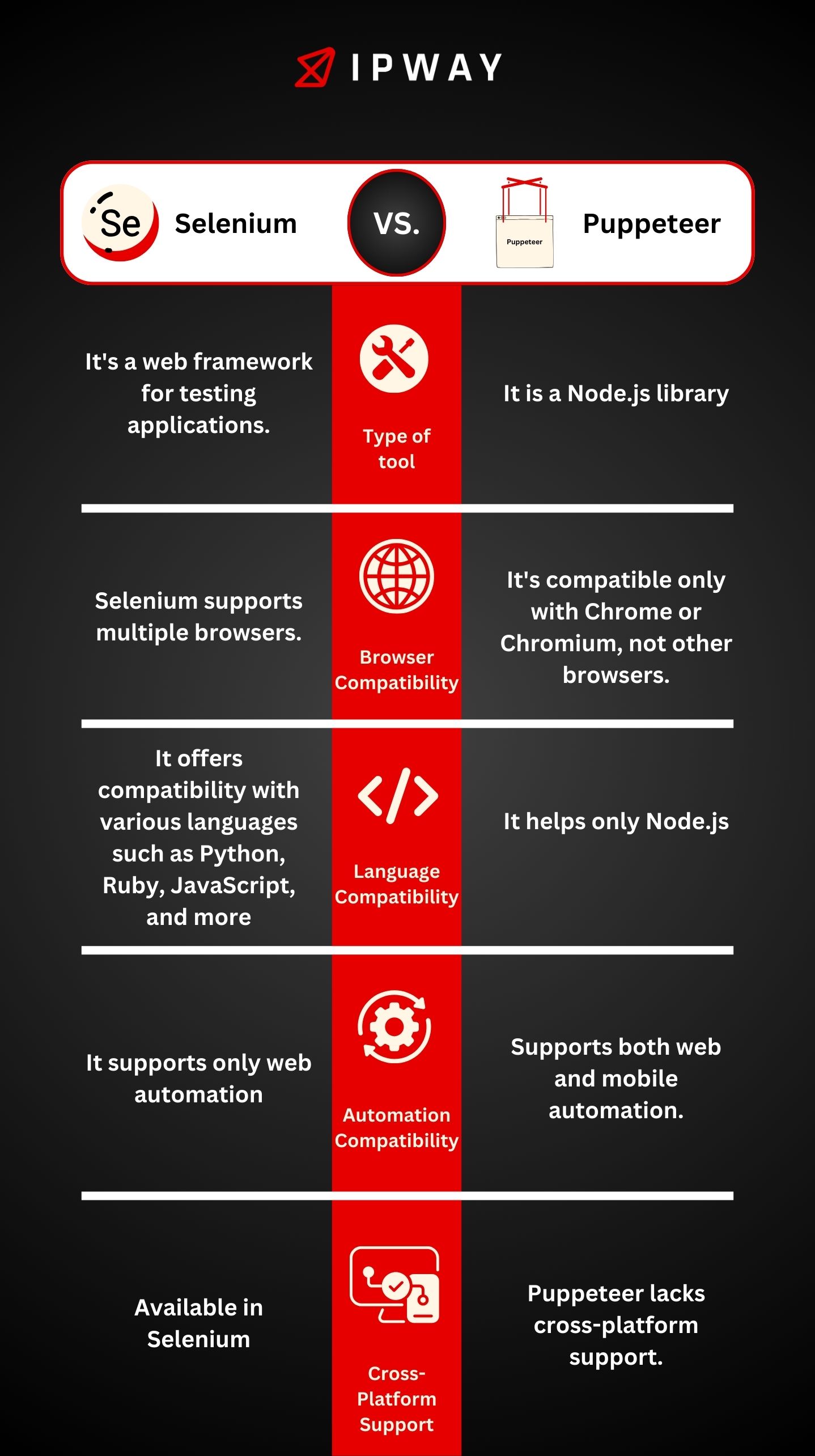Selenium vs Puppeteer: When it comes to automating tasks on the web, they are two players that shine.
Automation is incredibly important in today’s world as it helps streamline tasks and boost efficiency. When it comes to automating web testing and browser tasks developers often rely on tools like Selenium and Puppeteer. While these two tools serve purposes it’s crucial to understand their differences before making an informed decision. In this guide we’ll dive into the nuances, between Selenium and Puppeteer examining their features, use cases and benefits extensively.
What Is Puppeteer?
Puppeteer, a library created by Google is a user Node.js tool that offers an advanced interface for managing Chrome or Chromium via the DevTools Protocol. It empowers developers to carry out actions like web scraping, creating PDFs taking screenshots and automating user interactions on webpages. Thanks to its integration with Chrome DevTools and user friendly nature Puppeteer has become the preferred option, for headless browser testing and automation purposes.
What Is Selenium?
Selenium is an automation tool that is widely utilized in testing web applications on various browsers and platforms. It comprises a collection of tools with Selenium WebDriver being one of them. This particular tool allows users to interact with web elements and perform actions like clicking buttons filling forms and navigating through pages. What is great about Selenium is that it supports programming languages such as Java, Python and JavaScript making it suitable for developers, with different levels of expertise.
Comparing Selenium vs Puppeteer:
When considering the differences of Selenium vs Puppeteer, various factors come into consideration such, as performance, user friendliness, adaptability and the level of community support.
- Performance: Puppeteer typically provides execution speed in comparison to Selenium particularly when performing headless browser operations. This advantage stems from Puppeteers ability to directly control Chrome or Chromium leading to optimized performance in tasks such, as rendering web pages executing JavaScript code and managing DOM elements.
- Ease of Use: The Puppeteer API is known for its user intuitive nature especially when compared to Selenium. With its simplified syntax and convenient built in features like handling of asynchronous operations and element selectors developers find it easier to write and maintain automation scripts. In contrast Selenium may require a bit effort to learn due to its higher learning curve but it provides greater flexibility and customization options that are particularly useful, for complex testing scenarios and large scale projects.
- Flexibility: Selenium is highly compatible with programming languages and browsers making it a suitable choice for a wide range of projects. It effectively supports languages such as Java, Python, C# and JavaScript along with multiple browsers like Chrome, Firefox, Safari and Edge. Moreover Seleniums WebDriver protocol enables integration, with third party tools and frameworks enhancing its flexibility and ability to adapt.
- Community Support: Selenium has been around, for a time and has a larger group of people using it and contributing to it as compared to Puppeteer. This means that Selenium has plenty of documentation, tutorials and resources which makes it easier for developers to begin using it and resolve any problems they may encounter. On the hand Puppeteer is relatively newer but still has a growing community that actively develops and updates its features and performance to ensure ongoing improvement.
Start Automated Web Testing With Selenium vs. Puppeteer
When it comes to automating web testing tasks, both Selenium and Puppeteer are highly proficient. However the choice of which tool to use ultimately depends on your needs and personal preferences.

Selenium
If you require compatibility across web browsers, extensive language support and a well established ecosystem Selenium is the best choice. It is particularly suitable for testing projects on a scale, enterprise level applications and situations where compatibility, with various browsers and platforms is of utmost importance.
Puppeteer
If you value quickness ease of use and the ability to smoothly work with Chrome DevTools Puppeteer is an option. It works well for single page applications testing headless browsers and carrying out tasks that demand top notch performance and accuracy. Moreover the close integration between Puppeteer and Chrome DevTools allows for debugging and performance monitoring capabilities making it a valuable tool, for web developers and testers.
When to Choose Selenium vs. Puppeteer?
When it comes to choosing between Selenium vs Puppeteer, the final decision should depend on your project requirements, priorities and technical needs. Take into account the following situations:
Choose Selenium if you require
- Testing websites on web browsers to ensure compatibility
- Support for various programming languages such as Java, Python, C# and JavaScript
- Compatibility with popular web browsers like Chrome, Firefox, Safari and Edge
- Integration capabilities with third party tools and frameworks like TestNG, JUnit and NUnit
- A well established community with extensive documentation and tutorials, for support
Choose Puppeteer if you prioritize
- Fast and efficient execution when testing and automating browsers.
- User friendly and straightforward particularly suited for newcomers and small scale projects.
- Seamless integration with Chrome DevTools for debugging and monitoring capabilities.
- Exact control over Chrome or Chromium for tasks such, as web scraping and capturing screenshots.

Bottom Line
To sum up, Selenium vs Puppeteer are both resources for automating web testing and browser tasks. Although Selenium provides versatility, wide compatibility and a established ecosystem Puppeteer stands out due to its speed, simplicity and seamless integration with Chrome DevTools.
By comprehending the differences between these two tools and taking into account your project requirements and goals you can make a choice and select the most suitable tool, for your automation needs.
Try IPWAY today and supercharge your Selenium or Puppeteer projects like never before!
